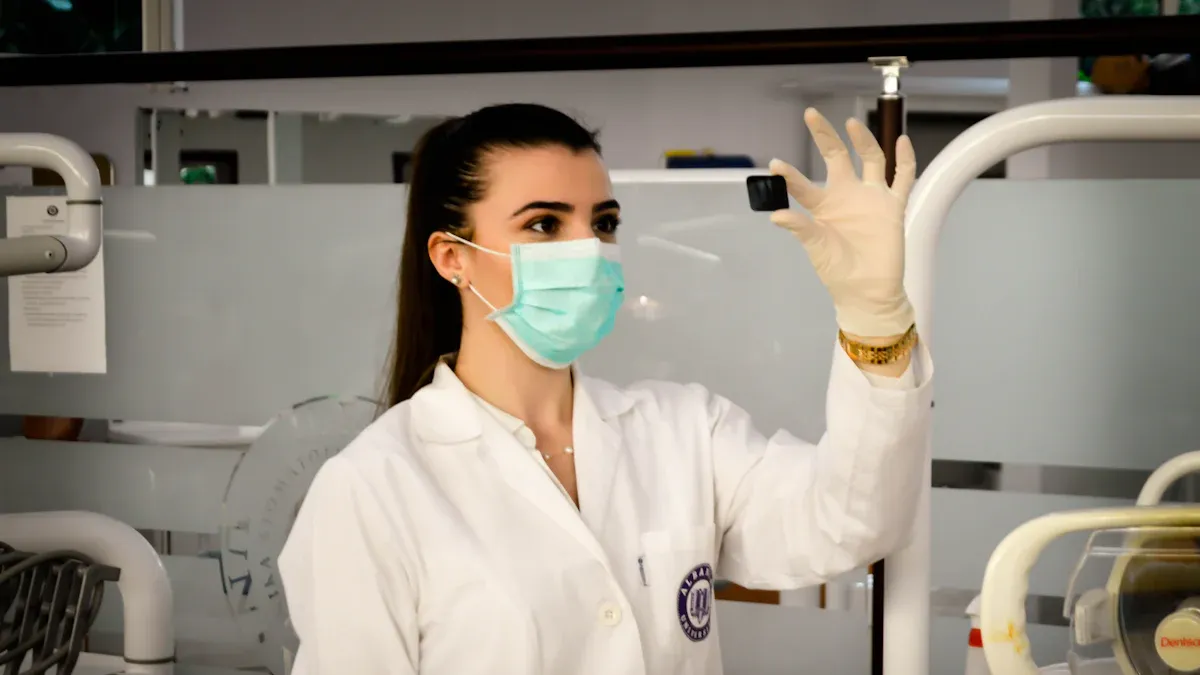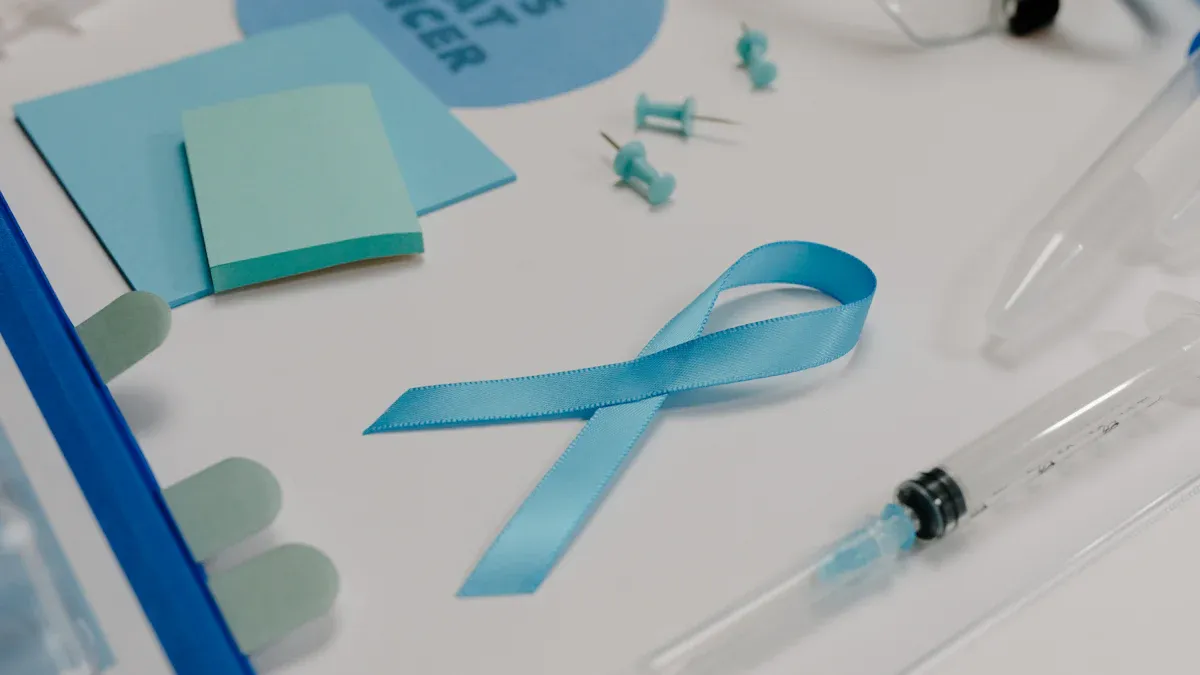Why Continuing Education Matters in Cancer Care

Cancer care evolves rapidly, highlighting The Role of Continuing Education in Professional Cancer Care Practice for healthcare professionals. New treatments, such as those for CLL and MCL, often reveal knowledge gaps that continuing education can effectively address. Staying updated ensures you understand emerging therapies and molecular testing, which are crucial for managing complex cases. Recent studies also link ongoing education to improved skills and confidence, enabling better patient outcomes. With advancements reducing cancer death rates, you play a vital role in maintaining this progress. By prioritizing education, you can adapt to changes and deliver exceptional care.
Key Takeaways
Continuing education helps healthcare workers learn about new cancer treatments. This ensures they give the best care to patients.
Learning new rules and methods improves patient safety. It also helps healthcare workers feel confident handling tough cases.
Teamwork gets better when healthcare workers learn together. This leads to improved care and better results for patients.
Getting certifications and special training builds skills. It helps healthcare workers keep up with changes in cancer care.
Online courses and flexible options make learning easier. Busy workers can learn without changing their schedules too much.
The Role of Continuing Education in Professional Cancer Care Practice

Keeping Up with Advances in Cancer Treatments
Cancer treatments are evolving at an unprecedented pace. Staying informed about these advancements is essential for delivering effective care. You need to understand the latest therapies, such as targeted treatments and immunotherapies, to provide the best options for your patients. Recent innovations, like hospital-in-the-home programs and home-based chemotherapy, are transforming how care is delivered. These models improve accessibility and reduce the burden on patients, ensuring they receive treatment in a more comfortable environment.
Advancements in cancer research also emphasize early detection and prevention. By keeping up with these developments, you can help shift the focus from managing end-stage diseases to identifying and treating cancers earlier. Collaboration among leading research centers has accelerated progress, making it even more important for you to stay updated. Continuing education ensures you remain equipped to integrate these breakthroughs into your practice, ultimately improving patient outcomes.
Adapting to New Guidelines and Protocols
Cancer care guidelines and protocols are constantly updated to reflect the latest research and clinical evidence. Adapting to these changes is crucial for maintaining high standards of care. For example, tools like the NCCN guidelines integrated into platforms like Halo Intelligence provide real-time, evidence-based recommendations. These tools help you make informed decisions and tailor treatments to individual patient profiles.
By staying current with new protocols, you can ensure that your practice aligns with the most effective and safe treatment options. This not only enhances patient care but also boosts your confidence in managing complex cases. Continuing education plays a vital role in helping you navigate these updates, ensuring that you deliver care that meets the highest standards.
The Importance of Interprofessional Collaboration
Cancer care often involves a team of specialists working together to provide comprehensive treatment. Interprofessional collaboration is key to achieving the best outcomes for your patients. Continuing education programs focused on interprofessional education (IPE) improve communication and teamwork among healthcare professionals. These programs foster a patient-centered approach, ensuring that every aspect of care is coordinated and effective.
Research shows that IPE leads to significant improvements in clinical practice and institutional policies. It helps you overcome barriers to collaboration, promoting efficient teamwork necessary for effective cancer treatment. By participating in these programs, you can enhance your clinical competencies and contribute to a more cohesive care team. This collaborative approach not only benefits your professional growth but also ensures that your patients receive the highest quality of care.
Benefits of Continuing Education in Cancer Care

Improving Patient Outcomes and Quality of Care
Continuing education directly impacts the quality of care you provide to patients. By staying informed about the latest advancements, you can offer treatments that align with current best practices. For example, understanding new therapies like immunotherapy or targeted treatments allows you to tailor care to each patient’s unique needs. This personalized approach improves outcomes and enhances the overall patient experience.
When you engage in lifelong learning, you also gain access to updated tools and techniques. These resources help you detect cancers earlier and manage them more effectively. Early detection often leads to better survival rates and less invasive treatments. Patients benefit from improved care, and you contribute to the broader goal of reducing cancer mortality rates.
Enhancing Professional Competence and Confidence
Continuing education strengthens your skills and boosts your confidence in handling complex cases. Programs like E-PIMUC have shown remarkable results in this area. Among 751 healthcare professionals enrolled, 81.0% actively engaged with the content, and 33.2% passed all assessments, earning certifications and professional credits. Participants reported a significant increase in declarative knowledge, with a confidence improvement of 1.4 points in applying immunotherapy principles. High satisfaction ratings, ranging from 94.3% to 95.1%, further highlight the program's effectiveness.
These outcomes demonstrate how structured learning opportunities can enhance your expertise. When you feel confident in your abilities, you make better decisions and provide higher-quality care. This confidence also translates into stronger communication with patients, helping them feel reassured and informed about their treatment plans.
Building Emotional Resilience in a Demanding Field
Cancer care is emotionally challenging. You often face high-stress situations that require both technical expertise and emotional strength. Continuing education can help you build resilience, enabling you to manage these demands effectively. Training programs focused on compassionate care have shown significant benefits. For instance:
Nurses trained in aesthetic and compassionate care reported improved emotional resilience, allowing them to manage their emotions better while delivering holistic care.
Another study found that emotional resilience training reduced stress levels and enhanced well-being among participants. These findings underscore the importance of workplace resources in fostering emotional strength.
By participating in such programs, you can develop coping strategies that improve your mental health. Emotional resilience not only benefits you but also enhances your ability to provide empathetic and patient-centered care. This balance is crucial for maintaining long-term success and satisfaction in your career.
Practical Approaches to Continuing Education
Pursuing Certifications and Specialized Training
Certifications and specialized training help you stay ahead in cancer care. They provide you with the latest knowledge and skills to manage complex cases effectively. For example:
Oncology nurses gain unique insights through certifications like OCN® or Pediatric Hematology Oncology Nurse. These credentials enhance your expertise and improve patient outcomes.
Specialty certifications, such as the Advanced Palliative and Hospice Social Work Certification (APHSW-C), recognize your ability to deliver high-quality care in hospice and palliative settings.
By pursuing these certifications, you not only strengthen your professional stature but also ensure your patients receive the best care possible. Specialized training equips you to handle advancements in treatments and protocols, making you a valuable asset in your field.
Attending Workshops, Seminars, and Conferences
Workshops, seminars, and conferences offer hands-on learning opportunities. These events connect you with experts and peers, fostering knowledge exchange. You can explore the latest research, technologies, and treatment methods in cancer care. For instance, attending a seminar on immunotherapy can help you understand its application in patient care.
Conferences also provide a platform for networking. Engaging with other professionals allows you to share experiences and gain fresh perspectives. These interactions often lead to collaborations that improve patient outcomes. By participating in these events, you stay informed and contribute to advancing the field.
Leveraging Online Learning Platforms and Resources
Online learning platforms make continuing education more accessible. They offer flexibility, allowing you to learn at your own pace. Resources like webinars, e-courses, and virtual simulations cover a wide range of topics in cancer care. For example, you can explore modules on targeted therapies or molecular testing.
Many platforms also provide certifications upon course completion, adding value to your professional profile. Additionally, online forums and discussion groups enable you to engage with a global community of healthcare professionals. This collaborative learning environment helps you stay updated and adapt to new developments in cancer care.
Engaging in Peer Networks and Collaborative Learning
Engaging in peer networks and collaborative learning can significantly enhance your professional growth in cancer care. These networks connect you with like-minded professionals who share similar challenges and goals. By collaborating with peers, you gain fresh perspectives and practical insights that improve your clinical practice.
Why Peer Networks Matter
Peer networks provide a platform for sharing experiences and knowledge. For example:
You can discuss complex cases and learn how others approach similar situations.
You can stay informed about emerging trends and best practices in cancer care.
These interactions foster a sense of community and support, which is essential in a demanding field like oncology.
Tip: Join professional organizations like the Oncology Nursing Society (ONS) or the American Society of Clinical Oncology (ASCO). These groups often host forums and events where you can connect with peers.
Collaborative Learning Opportunities
Collaborative learning encourages teamwork and problem-solving. Participating in group discussions, case studies, or journal clubs allows you to explore diverse viewpoints. This approach not only broadens your understanding but also helps you develop critical thinking skills.
Here are some ways to engage in collaborative learning:
Virtual Communities: Platforms like LinkedIn or specialized forums offer spaces for professional dialogue.
Mentorship Programs: Pairing with a mentor or mentee fosters mutual learning and growth.
Interdisciplinary Teams: Working with professionals from different specialties enhances your ability to deliver holistic care.
By actively participating in peer networks and collaborative learning, you strengthen your expertise and build lasting professional relationships. These connections empower you to stay updated and deliver the highest quality of care to your patients.
Addressing Challenges in Continuing Education
Overcoming Time Constraints for Busy Professionals
Finding time for continuing education can be difficult when you manage a demanding workload. Cancer care professionals often juggle patient care, administrative tasks, and personal responsibilities. This makes it challenging to prioritize learning. However, flexible learning options can help you overcome these barriers. Online courses, for example, allow you to study at your own pace. You can access materials during breaks or after work hours, making it easier to fit education into your schedule.
Short, focused learning modules also save time. Microlearning platforms offer quick lessons on specific topics, helping you gain knowledge without lengthy commitments. By choosing these options, you can stay updated without disrupting your daily routine. Time management strategies, such as setting aside dedicated learning hours each week, can further support your educational goals.
Ensuring Affordable and Accessible Learning Opportunities
Cost and accessibility often limit your ability to pursue continuing education. Many professionals face financial constraints or lack access to in-person events. Organizations like SOCRA address these challenges by offering affordable and flexible learning options.
Evidence Description | Details |
|---|---|
Commitment to Low-Cost Education | SOCRA emphasizes providing low-cost education while maintaining high-quality standards. |
Virtual Course Offerings | Many in-person conferences are available virtually, reducing expenses and increasing accessibility. |
No-Cost Continuing Education Options | Several no-cost options for earning continuing education credits (CEUs) are available. |
On-Demand Online Courses | Free on-demand online courses are offered to members for convenient access to quality education. |
These initiatives ensure you can access valuable resources without financial strain. Virtual and on-demand courses also eliminate travel costs, making education more inclusive. By exploring these options, you can continue learning without compromising your budget.
Encouraging Institutional Support for Lifelong Learning
Institutions play a crucial role in supporting your educational journey. When your workplace values lifelong learning, it becomes easier to pursue professional development. Employers can provide resources like tuition reimbursement, paid study leave, or access to training programs. These benefits encourage you to invest in your skills and knowledge.
Creating a culture of learning within your organization also fosters growth. Regular workshops, team discussions, and mentorship programs can inspire you to stay engaged. When institutions prioritize education, they empower you to deliver better care and achieve career satisfaction. Advocate for these initiatives in your workplace to ensure ongoing support for your learning needs.
Continuing education forms the foundation of excellence in cancer care. It keeps you informed about advancements, enabling you to provide the best outcomes for your patients. Lifelong learning strengthens your skills, builds emotional resilience, and helps you adapt to changes in this dynamic field.
Tip: View continuing education as an investment in your career and your patients' well-being.
By embracing these opportunities, you can grow professionally and make a meaningful impact in cancer care. Stay curious, stay committed, and continue learning to deliver exceptional care every day.
FAQ
What is the best way to start with continuing education in cancer care?
Begin by identifying your learning goals. Explore certifications, online courses, or workshops that align with your interests. Many organizations, like the Oncology Nursing Society (ONS), offer resources tailored to cancer care professionals.
Tip: Start small with free webinars or short courses to build momentum.
How can I balance continuing education with a busy work schedule?
Use flexible learning options like online courses or microlearning platforms. Dedicate specific time slots each week for education. Short modules or on-demand resources can help you stay updated without overwhelming your schedule.
Note: Prioritize topics that directly impact your daily practice for maximum benefit.
Are there affordable options for continuing education in cancer care?
Yes, many organizations provide low-cost or free resources. For example, SOCRA offers free on-demand courses for members. Scholarships and grants are also available for certifications and conferences.
Resource Type | Example Providers |
|---|---|
Free Webinars | ASCO, ONS |
Scholarships/Grants | AACR, Cancer Research UK |
How does continuing education improve patient care?
It keeps you informed about the latest treatments and protocols. This knowledge helps you provide personalized care, improving patient outcomes. Staying updated also boosts your confidence in managing complex cases.
Reminder: Lifelong learning ensures you deliver care that meets the highest standards.
What role do peer networks play in continuing education?
Peer networks offer valuable opportunities for collaboration and knowledge sharing. They help you learn from others’ experiences and stay informed about emerging trends. Joining professional organizations or online forums can connect you with like-minded professionals.
Tip: Participate in mentorship programs to gain insights and grow professionally.
See Also
Recognizing Duodenal Cancer: Symptoms And Available Treatments
Conjunctival Melanoma: Key Symptoms And Treatment Options
Essential Information About Carcinoid Tumors And Their Impact
Why Having Cancer Doesn't Always Mean Poor Health
Cholangiocarcinoma: Important Features And Understanding Its Impact

